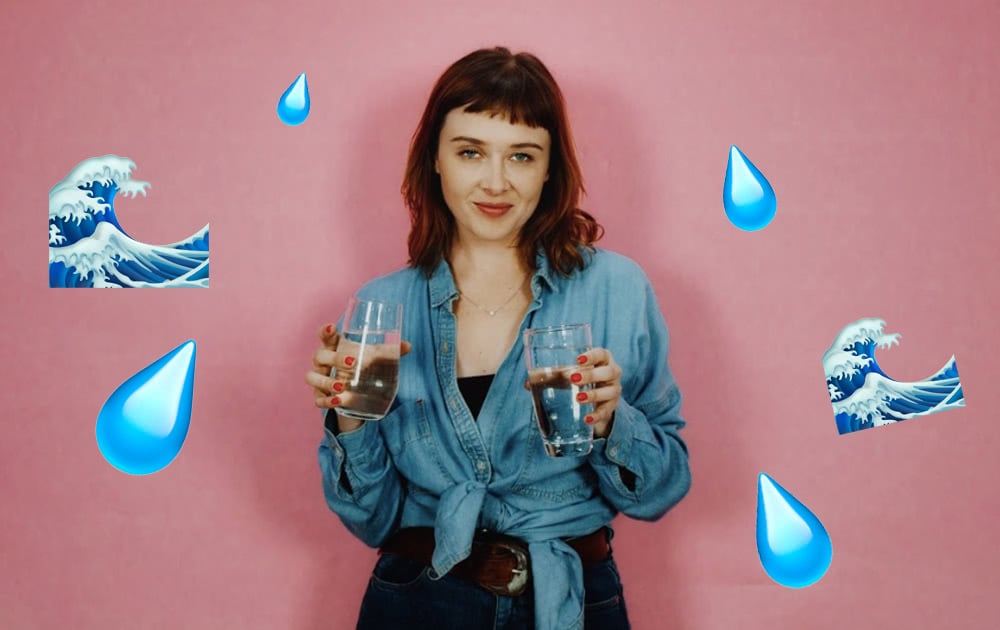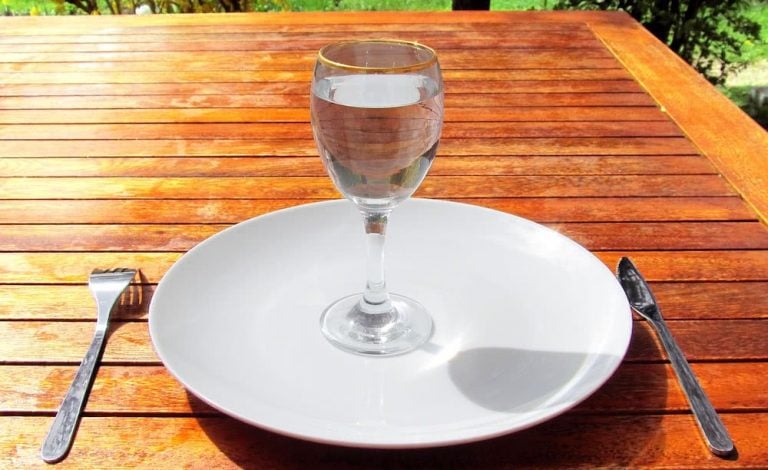Content warning: This article discusses disordered eating and water fasting.
I first came across water fasting two years ago when a gorgeous, tanned yogi at my local studio told me she had not eaten for five days. We’d done a sweaty class together and I couldn’t believe she’d completed a vigorous 90 minutes of vinyasa flow with nada in her tank but… water? We’d been doing things like handstands and backbends; she hadn’t missed a beat.
‘Why are you doing that?!’ I asked, genuinely concerned.
“All the time we have fresh food, fresh water, everywhere,” she told me. “We take it for granted. It’s been hard, but I have learned a lot about being grateful for everything we have around us. I just used to take and take. I never even used to think about it.”
It’s very easy to do a lot of cursory reading on the internet about ‘health’ and ‘wellness’. The content creators producing these listicles and long forms range from frustrated experts to the enthusiastic, glossy-eyed babe-in-the-woods types: the instagrammers, and the influencers. Health writing has become conflated with a brand new context that is full of a vivid sense of discovery and exploration – trends are written about like they are revelatory and life changing.
When you follow ‘Wellness’ and ‘Spiritual’ types on Instagram and other platforms, you see trends wash through the community. Some having staying power: fads that won’t go away like green smoothies, acai, body brushing, coconut oil, and drinking more water. Some are fleeting and funny, like when the Kardashians tried to sell everybody those unstable shoes for weight loss.
Anyone can make an Instagram account and call themselves an expert, which is fine, I guess, but it can also be dangerous. Anyone can buy Instagram followers and buy likes – the price point for this kind of social media manipulation is, frighteningly, not high. The legitimacy these numbers give an influencer is pronounced – a large following is seen as endorsement – and it’s difficult to see whose followers and likes are real.
I know how easy it is to look for a quick fix – I’m an ex bulimic! Controlling your weight actually makes you feel quite vital and high. But quick fixes eventually burn out, which leaves you feeling like a mega failure.
When I came across #waterfasting in my yoga studio, I searched it as a hashtag on Instagram and was both horrified and morbidly intrigued. It was niche, but it was popular. This wasn’t a juice fast for techies worth hundreds of dollars – I had heard about it from legit yogis.
This seemed like some ancient monk-like secret of health and vitality. Nobody was paying anybody to promote water fasting, because, well, there was nothing to sell. It’s just… water and… nothingness. It appealed very deeply to my dual interests in Eastern mysticism and my own secret crushing and shallow insecurities.
There are people on the internet who claim to regularly go for stints of like 10 to 20 days without consuming anything but water. I found one Swedish Youtuber in Thailand who not only doesn’t eat, but forgoes showering. I guess because if you shower, the water gets in, like through osmosis through your skin, like a frog? I don’t know.
Notably, water fasters claim that going without food for extended periods of time can fix a lot of health problems. Let me list some of them for you:
-Weight Loss
-Acne
-Allergies and Asthma
-Anxiety
-Arthritis
-Autoimmune illnesses
-‘Busting’ benign tumours
-Chronic back and joint pain
-Chronic fatigue syndrome
-Colitis
-Digestive disorders
-Eczema and other disorders of the skin
-Hayfever
-Headaches
-Heart disease
-High blood pressure
-High cholesterol
-Hyperactivity
-I.B.S
-Lupus
-Migraines
-Osteoporosis
-PMS
-Psoriasis
-Recurrent infections
-Sinusitis
-Uterine fibroids
I did quite a lot of reading about water fasting on the internet, but honestly there didn’t seem like there was a lot to it. It just required you to stop eating. All the websites did say was that you should forgo your normal daily activities. That means if you want to stop eating, you need to stop working. And exercising. And you know, interacting with other food-eating human beings, because you’re probably going to start acting really weird.
Apparently, you really need to just release into your downtime because of the extreme exhaustion that is about to beset you. I came across one website where a water faster admitted he definitely wouldn’t have been able to attain the deep spiritual liberation that comes from water fasting if it weren’t for ‘Netflix.’ Amazing stuff.
I also came across a particularly disturbing personal account of one water faster who had attended an expensive and extended program in Costa Rica and – despite being monitored by medical staff – had come very close to actually dying.

As horrific and harrowing as her testimony was, I focused on the good stuff. I decided I was ready for everything that water fasting had to offer me. Weight loss. Cleansing. Spiritual and personal insight. Weight loss. Weight loss. Weight loss. I would rock on with no food for five full days.
Normal, right? I wanted the time, just me and my body and water, surviving! I felt like this was my chance to shake off a lifetime of bad baggage around eating, food and my body. I read one somewhat deranged but still kind of inspirational post where somebody described overcoming hunger, aches and weakness. He said he ‘really felt the toxins leaving.’ Code: weight loss.
I confided in some friends what I was doing, and all of them were horrified. “Phoebe, please no!” they all said. But I was entranced and hypnotised by the glowing eyes and tanned (or maybe it was jaundiced) skin of the community of silent water fasters I’d come to know and love littering my newly curated Instagram feed. We had the answer: it was Netflix and nil.
Of course, the first 24 hours were not that hard. I was high and excited on the adrenaline of all the enlightenment the internet had promised me. I was freelancing and had stockpiled some free time, so I didn’t have to really think in a complex way or problem-solve, or, importantly, have any normal conversations. I allowed myself herbal tea and the errant black coffee because, uhhh, I needed to write.
24 hours in, I started telling myself that it wasn’t that hard. It wasn’t that hard. A full day had passed and I drank three litres of water, which was a good effort. When it hit midnight on day two, I looked out my windows – which have security bars on them – and I could see a glinting and bright moon peeking through the trees. It was sparkling, and I felt like it was shining right on me, illuminating my face and everything in my bedroom. I felt so lucky to have turned my exhausted head at that time to see the moon. Wow, the moon!
I decided I was mildly tripping. Then I fell asleep with Netflix playing Gossip Girl.
I woke up the next day with some kind of water hangover. My head was hurting.
I was just over 48 hours in when a friend texted me and asked me if I was going to her farewell drinks that night. I had completely forgotten that I was supposed to be out, socialising, seeing people. Eating. Drinking. I thought about making up some excuse so I could continue my fast.
“I’m so sorry babe,” I texted. “I have food poisoning!” I sent the message and threw my phone across the room so I didn’t have to deal with the disappointed reply. I lolled around on my bed for what must have been three hours until I had enough energy to sip water and slap my hand on my laptop enough to get Netflix working.
Intermittently I stood up and looked at myself in the mirror and found the experience confronting and weird.
Here I was, lying in bed, not hungry at all, but too tired to do anything. I had Netflix playing episode after episode of Gossip Girl, which I had come to loathe, but I was far too exhausted to take it off autoplay. Blair Waldorf swanned on and off the screen in various states of rage, and I looked on at the Upper East Siders from my room in my share house in dull confusion.
I started thinking about being on drugs, and relapse. I have been addicted to controlling my weight in the past, and here I was lying in bed too weak to move, thinking about cancelling plans so I could continue not eating. I mean, can you relapse into eating disorders?
When I watched Gossip Girl at its time of airing, I remember reading a hot take that compared the soap opera to a constant state of repulsion at self, mired in one’s friendships, followed by redemption and rebirth. It said something like, ‘You can make mistakes, but you need to be able to look yourself in the mirror at the end of the day.’ When I talk to friends about my own spiritual practice, I find it hard to explain the concept of striving for enlightenment in the knowledge that I, and everyone around me, is so deeply flawed. This is dualism: it’s what you have to strive to reconcile.
I had been successful in being able to give up food for about 60 hours, I guess, and I had been able to stop constantly thinking about food. But what had I done in this time? I had lay in bed, wandered around my house and looked at myself in the mirror a lot. I had clocked an embarrassing amount of Netflix hours. I had hallucinated a glinting moon smiling at me, because I was starving. A lot of the things promised to me had never seemed to happen though. I achieved no mental clarity or rushing euphoria. All I felt was guilty and shallow.
One thing I can say about detox and retreat is that the revelations you seek are never the ones you will be gifted. I wanted the water fast to cure me of my issues with food. I wanted freedom and happiness from my gnawing anxieties about my body; I wanted to be more spiritual, less shallow.
This is not what I got. I beelined out of my bedroom, with its prison bars, and went to my fridge, phone in my hand. I chugged apple juice and chewed on string cheese. A minute later, I was texting my friend. “I feel better,” I wrote. “I’ll be there soon.”
If you or anyone you know is struggling with disordered eating or body dysmorphia of any kind, you are not alone. There are services to help you heal at the numbers below, or you can email the writer of this article, who will write back to you (I promise) at phoebeloomes (at) gmail (dot) com.
Chat online or over the phone to The Butterfly Foundation
Wesley Mission Eating Disorder Crisis Centre


































